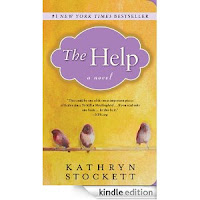 That's right. I've already finished my 2nd book! Maybe 30 books before 30 isn't too tall an order! (Let's check back in with this flood of enthusiasm/optimism once I'm done with vaca and work picks back up). And, yes, I also adjusted my goal to 30 finished books rather than books read. I don't think books on tape are anything less than books I actually read. Books on tape are awesome. Talk about the ultimate multi-tasking tool!
That's right. I've already finished my 2nd book! Maybe 30 books before 30 isn't too tall an order! (Let's check back in with this flood of enthusiasm/optimism once I'm done with vaca and work picks back up). And, yes, I also adjusted my goal to 30 finished books rather than books read. I don't think books on tape are anything less than books I actually read. Books on tape are awesome. Talk about the ultimate multi-tasking tool!Anyway, to the book (and soon-to-be movie!). I had been listening to The Help by Kathryn Stockett on my iPhone while running, doing errands, wandering the city, etc. In fact, I loved it so much that I found myself doing random chores and stuff just so I could continue to "read" it! Needless to say I finished it in record time. Well, record for me anyway.
I'll talk specifically about the audiobook version. There were several different actresses as the readers. This aspect of the recording made the book more real to me. I'll miss the characters—especially Minny! For those of you without tv that haven't seen the trailer, it's a book about Jackson, Mississippi in the early 1960s and tracks the lives of domestics and the white women they serve illuminating severe race inequalities and the power of a few women. But even that description does not do it justice. It was truly one of the most delightful and engaging books that I have read in a long time. In fact, just writing and thinking about it makes me want to put my earbuds in and play it again. Hopefully, I will not have to work this upcoming weekend so I can check out the movie in the theater!
